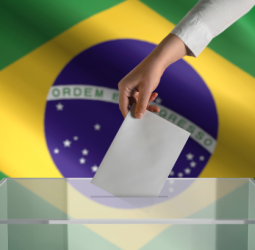The Brazilian presidential election is one of the most highly anticipated events in the political landscape of Latin America. In 2024, the country will once again hold its election and the coverage of this complex process will be crucial in informing the public and shaping the outcome of the race.
The Brazilian media, both traditional and digital, play a significant role in providing extensive coverage of the elections. This coverage is not limited to the campaigns and candidates, but also includes in-depth analysis of policies, political parties, and electoral processes. The coverage is not just limited to the national level, but also extends to local and regional elections, providing a comprehensive understanding of the country's political climate.
The coverage of the Brazilian elections is a challenging task for the media due to the country's vast size and diverse population. Brazil is the fifth-largest country in the world by both area and population, with over 200 million inhabitants spread across 26 states and a federal district. This large and diverse population presents a unique challenge to the media in ensuring that all voices and perspectives are represented in the coverage.
The most significant aspect of the coverage is the presidential race, where the two main political parties, the Brazilian Social Democracy Party (PSDB) and the Workers' Party (PT), traditionally dominate. However, in recent years, there has been a rise of other parties and independent candidates, making the race more competitive and unpredictable.
The coverage of the Brazilian elections in 2024 is expected to be more digitized than ever before. With the increasing use of social media platforms and the internet, political campaigns are adapting to new strategies to reach a wider audience. The media plays a crucial role in fact-checking and verifying the information shared by candidates on these platforms, ensuring that voters are well-informed and not misled.
In addition to the traditional media outlets, many independent media organizations have emerged in Brazil, providing alternative coverage of the elections. These media outlets focus on issues such as corruption, human rights, and social justice, which may not receive enough attention from the mainstream media. This diverse range of coverage helps to provide a more well-rounded view of the elections, enabling voters to make informed decisions.
Another critical aspect of the coverage is the economic and social impact of the elections on Brazil and the world. Brazil is the ninth-largest economy globally and one of the biggest influencers in Latin America. As such, the outcome of the elections can have a significant impact on the country's economy and international relations. The media plays a vital role in analyzing and reporting on the potential consequences of the elections, providing voters with a better understanding of the implications of their vote.
With the advancements in technology and the increasing demand for real-time updates, the media has a responsibility to ensure accurate and unbiased coverage of the elections. This involves adhering to ethical standards of journalism and providing balanced coverage of all candidates and parties.
In conclusion, the coverage of the Brazilian elections in 2024 will be essential in shaping the country's future. As the race heats up, it is crucial for the media to provide comprehensive, unbiased, and fact-based coverage to help voters make informed decisions. The responsibility of the media goes beyond just reporting the news but also to hold candidates and parties accountable and provide a platform for diverse perspectives. With the media's support, Brazil can continue on its path towards a fair and democratic election process.
The Brazilian media, both traditional and digital, play a significant role in providing extensive coverage of the elections. This coverage is not limited to the campaigns and candidates, but also includes in-depth analysis of policies, political parties, and electoral processes. The coverage is not just limited to the national level, but also extends to local and regional elections, providing a comprehensive understanding of the country's political climate.
The coverage of the Brazilian elections is a challenging task for the media due to the country's vast size and diverse population. Brazil is the fifth-largest country in the world by both area and population, with over 200 million inhabitants spread across 26 states and a federal district. This large and diverse population presents a unique challenge to the media in ensuring that all voices and perspectives are represented in the coverage.
The most significant aspect of the coverage is the presidential race, where the two main political parties, the Brazilian Social Democracy Party (PSDB) and the Workers' Party (PT), traditionally dominate. However, in recent years, there has been a rise of other parties and independent candidates, making the race more competitive and unpredictable.
The coverage of the Brazilian elections in 2024 is expected to be more digitized than ever before. With the increasing use of social media platforms and the internet, political campaigns are adapting to new strategies to reach a wider audience. The media plays a crucial role in fact-checking and verifying the information shared by candidates on these platforms, ensuring that voters are well-informed and not misled.
In addition to the traditional media outlets, many independent media organizations have emerged in Brazil, providing alternative coverage of the elections. These media outlets focus on issues such as corruption, human rights, and social justice, which may not receive enough attention from the mainstream media. This diverse range of coverage helps to provide a more well-rounded view of the elections, enabling voters to make informed decisions.
Another critical aspect of the coverage is the economic and social impact of the elections on Brazil and the world. Brazil is the ninth-largest economy globally and one of the biggest influencers in Latin America. As such, the outcome of the elections can have a significant impact on the country's economy and international relations. The media plays a vital role in analyzing and reporting on the potential consequences of the elections, providing voters with a better understanding of the implications of their vote.
With the advancements in technology and the increasing demand for real-time updates, the media has a responsibility to ensure accurate and unbiased coverage of the elections. This involves adhering to ethical standards of journalism and providing balanced coverage of all candidates and parties.
In conclusion, the coverage of the Brazilian elections in 2024 will be essential in shaping the country's future. As the race heats up, it is crucial for the media to provide comprehensive, unbiased, and fact-based coverage to help voters make informed decisions. The responsibility of the media goes beyond just reporting the news but also to hold candidates and parties accountable and provide a platform for diverse perspectives. With the media's support, Brazil can continue on its path towards a fair and democratic election process.
You Must be Registered Or Logged in To Comment Log In?



 politics live casino
politics live casino
















